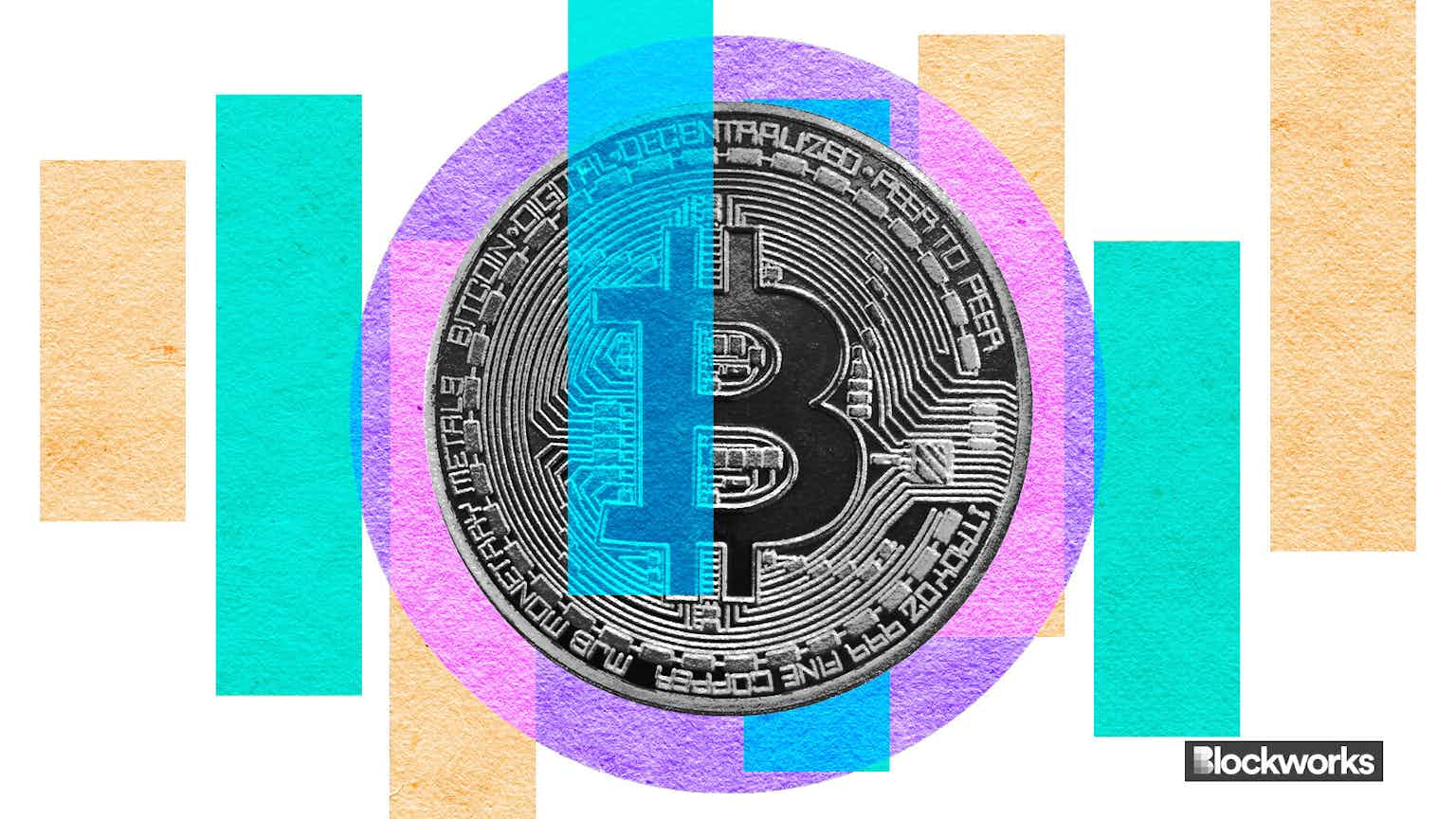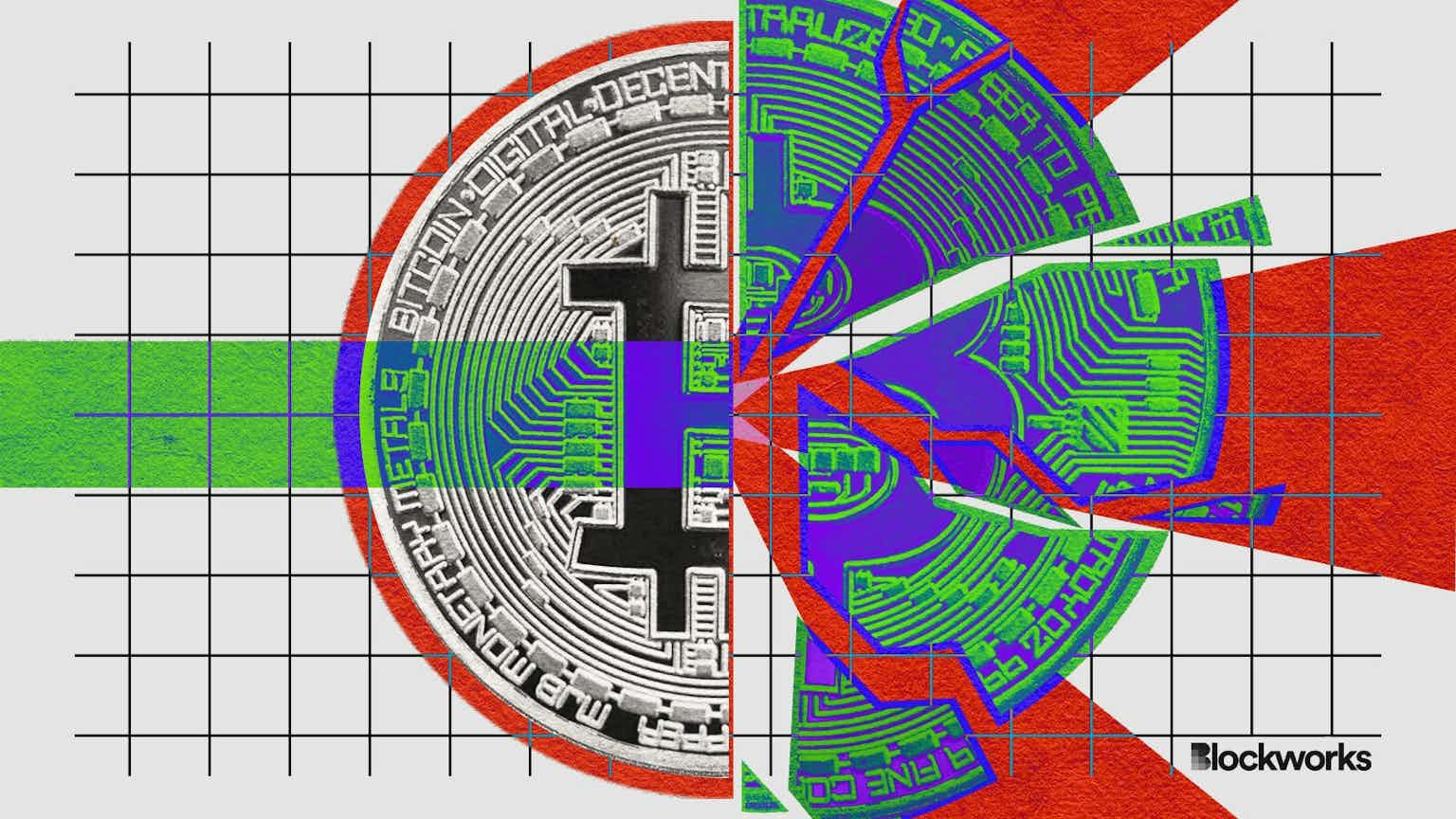Crypto Is More Correlated With Tech Stocks Than Ever – How Do We Decouple?
One crypto portfolio manager believes capitulation will inspire innovation

blockworks exclusive art by axel rangel
key takeaways
- Bitcoin’s price has tracked blue chip tech stocks such as Apple, Amazon and Microsoft all year
- The recent market downturn has only strengthened that correlation
Nearly $240 billion has been wiped from crypto markets since Friday as the macro headwinds weighing on digital assets intensify.
Bitcoin fell 15%, from $36,000 to trade around $30,700 at press time. Ether and XRP, respectively, shed 14.5% and 18%, while Solana’s SOL and binance coin were the hardest hit of the top cryptocurrencies – both dropping 19%.
Overall, crypto is now worth $1.4 trillion (a touch less than Alphabet’s market capitalization), having lost 15% over the weekend to its nadir since July 2021.
Crypto stocks also took a beating. Top mining stock Marathon Digital slumped 17% Monday; Coinbase tanked 18%; and MicroStrategy crumbled nearly 25% — which collectively equates to more than $5.4 billion in shareholder losses.
But sour crypto markets echo poor performing equities across the board. The S&P 500 dropped 2.5% as markets opened, and the tech-heavy NASDAQ 100 sank 3.5%.
The S&P and NASDAQ have now respectively lost 16% and 26% year to date. For scale, cryptocurrencies’ total value collapsed more than 35% over the same period, according to TradingView data compiled by Blockworks.
Indeed, crypto and equity markets are increasingly correlated, particularly with tech stocks, as bitcoin’s price has tracked blue chip tech stocks such as Apple, Amazon and Microsoft all year.
And little has changed in the most recent downturn. In fact, correlation is tightening.
“Right now, correlations are appearing across and within most asset classes, not just crypto,” Beimnet Abebe, vice president of principal trading at Galaxy Digital, told Blockworks.
Recent significant changes to monetary policy, Abebe said – on top of the highest inflation rates in a generation – have put pressure on crypto and other assets following a time of “extremely loose” federal bank quantitative easing-friendly regimes.
“Over the long run, we will see a decoupling of cryptoassets as tokens mature and develop all with their own idiosyncratic features,” Abebe said.
Crypto capitulation breeds innovation
But what will it take to see crypto actually decouple from tech stocks?
David Nage, portfolio manager at crypto investment firm Arca, told Blockworks it might take full capitulation.
Nage reasoned that a previous de-pegging of correlations between digital assets and tech stocks happened after March 2020, when both equity and crypto markets spiraled due to the pandemic becoming a black swan event.
Crypto markets took off in April, May and June of 2020 while tech stocks were still finding their footing. Many attributed those surges to widespread lockdowns, with day traders tapping digital assets with their stimulus checks.
So, it stands to reason that a rebound in crypto markets might be triggered once we see more experimentation across DeFi and gaming and decentralized finance (GameFi), according to Nage.
“I definitely believe the way that digital assets will potentially de-peg from its correlation with equities will be to attract interest, and it’s new platforms and innovation that create that,” he said.
But Nage isn’t seeing tremendous innovation in DeFi (decentralized finance). Instead, he’s mostly witnessing copy-paste projects that mimic Ethereum-powered DeFi projects that were popular in 2020: decentralized exchanges and automated market makers.
“What we’ve seen from past crypto winters, especially during 2018, is that there will be a period of time when innovation starts, when founders start to buckle down – they start building platforms that garner our attention and use-cases rather than raising funds every three months,” he said.
Nage pointed to three crypto companies that raised money through the last big “crypto winter”: Fireblocks, OpenSea and Blockdaemon. These are “formative pieces of infrastructure that have made a lot of things possible today,” he said.
Crypto can still become a tool to battle inflation
If other layer-1 chains have been hotbeds for innovation, why does the market still follow bitcoin?
“Bitcoin is the most liquid of all cryptoassets, so that’s where institutions are focusing their energy, making it likely to lead crypto market sentiment for the foreseeable future,” Galaxy’s Abebe said.
But crypto proponents once claimed digital assets could serve to hedge against growing inflation and even diversify portfolios. Bitcoin’s losses have instead amplified inflation over the past year, while crypto’s high correlation with tech stocks means digital assets serve as pseudo-leveraged bets on the world’s largest companies.
To Nage, the problem of inflation is now staring us in the face. It’s something that multiple generations haven’t had to deal with before. He envisions a period of adjustment which will birth new playbooks, guided by reviewing what we did before to curb inflation, “and that will take some time.”
“At the end of the day, our generation alongside newer generations are always going to be incredibly interested in digital assets and technology,” Nage said. “We’re the mobile-native, crypto-native generation – games, mobile devices, the internet, this is what we know.”
Don’t miss the next big story – join our free daily newsletter.





